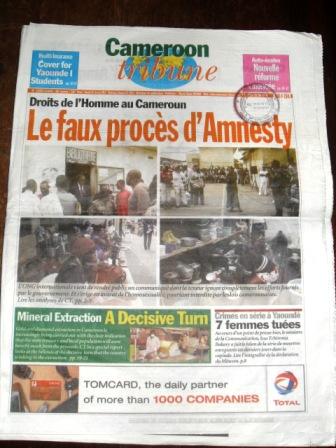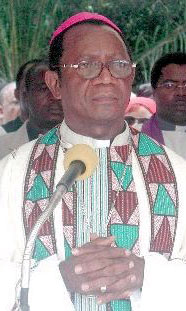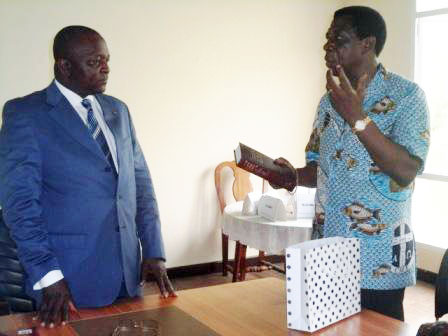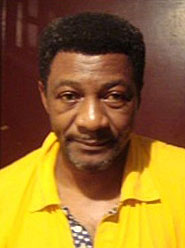In Cameroon, anti-gay voices grow louder

In Cameroon, the topic of homosexuality is no longer taboo. Both in Yaoundé and Douala, on the street, in taxis, restaurants, bars, offices and markets, on the radio and on television, it is difficult to spend a day or even an hour without the conversation reverting to this topic.
Opposition to homosexuality has become the focus of increasingly frequent conferences, panel discussions, sermons, religious campaigns, and interviews with politicians, bishops and other religious leaders in Cameroon, especially in the Cameroon Tribune, the government’s bilingual daily newspaper.
President Paul Biya suggests that people in Cameroon may be changing their minds about homosexuality, but the most obvious change is the frequency of discussions of the issue.
Increasingly, the issue of homosexuality comes up in day-to-day conversations. Most people agree: “With as much energy has we can muster, in the harshest terms possible, we must condemn this behavior, which is so harmful for Cameroon and its youth.”
Almost everyone “firmly” rejects the practice of homosexuality and its supposed corollaries, pederasty and prostitution, which together are called “deviance,” “moral decadence,” “true aberrations,” “amoral,” “unacceptable,” “satanic,” etc.
Conversations are fueled by the topic of homosexuality at home, in churches and in the press.
Consider how the Cameroon Tribune responded to the Amnesty International’s Jan. 24 report on human rights in Cameroon, which urged the repeal of Cameroonian laws against homosexuality and the release of LGBT prisoners.
For Amnesty International, those actions are a matter of human rights. But many in Cameroon see the issue differently.
Yves Atanga, the Tribune’s editor-in-chief, wrote a front-page article titled “Human rights in Cameroon: Amnesty’s false accusations. (Droits de l’homme au Cameroun: Le faux procès d’Amnesty).”
Editorial writer Makon ma Pondi wrote a column titled “Diversion: An anthem for homosexuals.” They took a stand against Amnesty International, calling it “an advocate of homosexuality” and a “finger-wagger,” and especially against homosexuality, “forbidden by Cameroonian laws.”
In his article, Atanga suggested that “in all honesty,” Amnesty should have entitled its report “Cameroon, leave the gays alone!” Pondi’s column complained about an “insidious and relentless campaign orchestrated for months through the media, seeking the repeal of the law [prohibiting sexual relations between persons of the same sex], to be achieved by any means necessary, including diplomatic pressure or withholding foreign aid.” The column asks, “Are we to believe that if we allow homosexuality and same-sex marriage we will achieve the economic growth we seek?”
Bishops say no, no, no!

Bishops of the Roman Catholic Church united in their opposition to homosexuality on Jan. 12 at the 36th annual gathering in Sangmelima of the National Episcopal Conference of Cameroon. In a statement published in its entirety on Feb. 7 in the Cameroon Tribune and later in other newspapers, they denounced homosexuality in strong terms.
They opposed “the multifaceted claims of human rights made by promoters of homosexuality — the right to marriage, to adopt children. to establish a family, to procreation with medical assistance, etc. — claims that are based on several concepts whose main ideology of gender … is opposed to classical ideas of family, gender and reproductive health.”
The bishops ignored examples of traditional African acceptance of same-sex relations. (See, for example, the article “What traditional African homosexuality learned from the West.”)
The bishops unanimously declared that homosexuality “falsifies human anthropology and trivializes sexuality, marriage and family as the foundation of society. In African culture, it is not part of the family and social values. It is a flagrant violation of the legacy left to use by our ancestors, who were faithful to heterosexuality and the family. In human history, homosexual practices have never led to societal evolution but have always been clear signs of civilization’s decay. In fact, homosexuality opposes humanity and destroys it.”
They urged “all believers and people of good will to reject homosexuality and so-called ‘gay marriage’ to pray for homosexuals and those who are inclined toward homosexuality, watching over them and seeking compassionately to convert them.”
Even before their statement was published, Mgr. Victor Tonye Bakot, the archbishop of Yaoundé and a fervent fighter against homosexuality, said in a Jan. 28 interview: “We do not want” homosexuality in Africa.
“The West has its culture and Africans have ours,” he said. “Since we must respect the parallels between the two cultures, and since we are in dialogue with each other, let us propose polygamy to the West just as they propose homosexuality to us. Otherwise, let each of us remain set in their own culture.”
“I reject this new attempt at colonialization. They’re going too far,” he said.
On Feb. 24, the Association of Catholic Jurists of Cameroon condemned homosexuality during a meeting in Douala with Samuel Kléda, archbishop of Douala.
Unnatural?
Although homosexual behavior has been observed in hundreds of species of animals, many people in Cameroon believe otherwise.
For example, in Archbishop Bakot’s sermons in the cathedral in Yaoundé and elsewhere, he condemned homosexuality as an “unnatural practice.”
In addition, attorney Pierre Robert Fojou told journalist Armand Essogo “not only is homosexuality punishable under Article 347 of the Cameroonian Penal Code, but it is also rejected by Cameroonians in general who, as good Africans, consider sexual relations between persons of the same sex against nature. ”

“This is not negotiable,” stated the Christian Men’s Fellowship of the Presbyterian Church in Cameroon, as it launched a February campaign against homosexuality in the southwestern part of the country. “God made man and woman; animals, he made male and female. It is unacceptable that a man fall in love with another man, which is worse than animals, because animals only make love with the opposite sex. I’ve never seen a hen have sex with another hen, or two female dogs, or two male dogs. The rooster goes with the chicken, and so on. So, if the man will do what even the animal does not, then man becomes worse than an animal. … It is satanic,” reported the newspaper La Nouvelle Expression in an article on Feb. 27 headlined “Southwest: Crusade against homosexuality.”
Tumfor Nico Halle, a lawyer who is president of the Christian Men’s Fellowship of Cameroon, argued that “not only does our penal code condemn homosexuality with Article 347 providing for imprisonment of up to five years, but the Bible is also even harder on it. Leviticus 20 verse 13 says that if a man lie with a man as one lies with a woman, it is an abomination. They shall surely be put to death: their blood will be on them.”
Bernard Okalia Bilai, governor of the Southwest region, agreed with those statements, adding that “as a practicing Christian, he would not allow homosexuality in his region by any means.”
He accused human rights attorney Alice Nkom not only of repeatedly supporting the “homosexual cause” but also of being corrupt. He claimed that, when he was a prefect in Wouri, she urged him to release a homosexual defendant, saying that “a lot of euros are at stake.” Nkom has not yet responded to a request for comment on this accusation.
Rejection of ‘anus-ocracy’

Similar discussions fill the air waves. All day long the radio hosts of FM Yaoundé and their listeners decry the “immorality” of homosexuality. Cameroon Radio and Television (CRTV), the national public television channel, focuses on the subject through debates, documentaries, short films (sometimes made by Cameroonians and other Africans who “reject this practice from the West”) and even in entertainment programs.
The best known of these programs is undoubtedly the show “Delire,” in which the now-graying master of ceremonies, Foly Dirane (the stage name of Adrian Tafen Veyreton), has not let a single show go by in over 20 years without warning youths aged 10 to 25 to watch out for homosexuals.
He boasts that in his 2001 song “Les Mouches,” he became the first singer to denounce homosexuality.
Although many LGBT people in Cameroon live in poverty — fired from their jobs and rejected by their families when their sexual preference becomes known — a widespread belief persists in Cameroon that homosexuals are rich, powerful and evil, even practicing black magic.
Foly Dirane claims that homosexuals are “sectarian pederasts who use money and employment as a bait to lure youths into their traps. By sodomizing their victims, they steal the youths’ power and good fortune,” he says.
“Homosexuality in Cameroon is not like homosexuality in Europe,” he says.
In Cameroon, homosexuals seek to impose an “anus-ocracy,” he says. “Homosexuality is a cult of pederasts who feed on youth.”
This cult’s sorcerers demand homosexuality as a condition sine qua non for young people to succeed in society, he says.
“The cult has chosen homosexuality as a means of domination,” he says. “This sect has money and power and wants to force all young Cameroonians to join them.”
“People without power are propelled into positions of great responsibility through their anus,” he claims.
With statements like those, it’s clear that the “debate” about homosexuality in Cameroon is far from over.
–Eric O. LEMBEMBE
Related articles
- Catholic lawyers push Cameroon to keep anti-gay law (76crimes.com)
- Court overturns 5-year sentence for gay sex in Cameroon (76crimes.com)
- Another 3 men in Cameroon jail for homosexuality (76crimes.com)
- Cameroon: Stop turning blind eye to death threats (76crimes.com)




Thank you for publishing this article. Far too often, the African clergy adopts the Western concepts of same gender love as perpetrated by bigoted Western so-called clerics. It’s time we, in the West, hold these self-proclaimed ministers accountable for the hate they export.